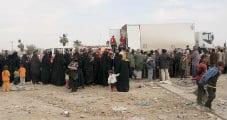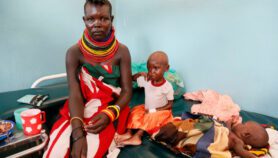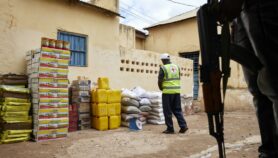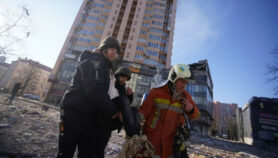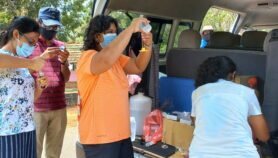By: Adel Fakhir
Send to a friend
The details you provide on this page will not be used to send unsolicited email, and will not be sold to a 3rd party. See privacy policy.
[BAGHDAD] Residents of Iraqi areas under Islamic State (ISIS) control are suffering from health problems due to a breakdown in local health services, shortages of medicines and contaminated drinking water.
Iraq’s Ministry of Health has confirmed that healthcare is declining in areas held by the militant Islamic group.
The ministry says it is trying to implement vaccination campaigns in collaboration with international organisations to stop viral diseases spreading across ISIS-affected areas. Activities such as insecticide spraying to kill disease-transmitting insects and the delivery of medicine to conflict-affected areas are also under way, it adds.
“Diseases that are currently widespread [in ISIS-held areas] include scabies, lice, and cutaneous and visceral leishmaniasis,” says Mohammed Jabr, the deputy director-general of the ministry’s public health department. “There are also cases of diarrhoea among internally displaced people due to the contamination of drinking water.”
Jabr tells SciDev.Net that “most of the diseases are related to general hygiene and are transmitted by vectors”. This is in addition to the limited availability of treatments for chronic diseases and routine vaccinations against infectious diseases such as measles and polio.
Earlier this month, the WHO sent emergency health kits to Dhuluiya, a town 55 miles north of Baghdad that ISIS had besieged for seven months. During the siege, which was broken late last month, it was impossible to help residents, the WHO said. The organisation estimated that 1,200 families still live in the town and said the emergency supplies will cover the needs of 5,000 people for three months.
In ISIS’s grip
Nearly 35 per cent of Anbar province in western Iraq is controlled by ISIS as the organisation tightens its grip on the towns and cities of Al Qa’im, Anah, Fallujah, Hit, Karma, Rawa and Rutba.
“Nevertheless, Anbar province is much better off than [the northern city of] Mosul as it has a health department and hospitals operating continuously,” says Ghada al-Shammari, who represents the province in Iraq’s parliament, the Council of Representatives.
Al-Shammari, who sits on the Council of Representatives’ health and environment committee, says medicines are transported into the province via the Baghdadi and Habbaniyah military bases, “in addition to the opening of a military route across the desert of Anbar”.
But in Mosul, which has been under complete ISIS control since June, it is extremely difficult to get medicine and basic health services to residents. According to al-Shammari, measles and polio cases have also emerged. She worries these will spread to other regions as “ISIS is blocking convoys carrying medications and vaccines”.
However, Syed Jaffar Hussain, a WHO representative in Iraq, tells SciDev.Net that “no new cases of polio have been reported in Iraq since it first appeared in February of last year”.
SciDev.Net was unable to speak to any Mosul residents due to power outages and a lack of internet service. But Zafer Younis, a former resident now living in Baghdad, says: “The state of hospitals in Mosul is deplorable due to the shortage of doctors and scarcity of drugs and anaesthetics.” He adds that ISIS is using any available drugs to first treat its wounded combatants.
Of those fleeing ISIS from Anbar province, al-Shammari says half have sought refuge in Iraqi Kurdistan, a semi-autonomous region in the north of the country that has resisted ISIS attacks, where many are living in refugee camps.
She says that the Ministry of Health’s mobile clinics struggle to reach these refugees.
Mental illness is another government priority, as exposure to war and displacement has had grave psychological effects on many refugees.
“The ministry is providing a comprehensive programme for camps to deal with people who have been exposed to severe psychological trauma,” says Jabr, but he admits that some cases have evolved into severe depression leading to suicide.
This piece was produced by SciDev.Net’s Middle East & North Africa desk.


